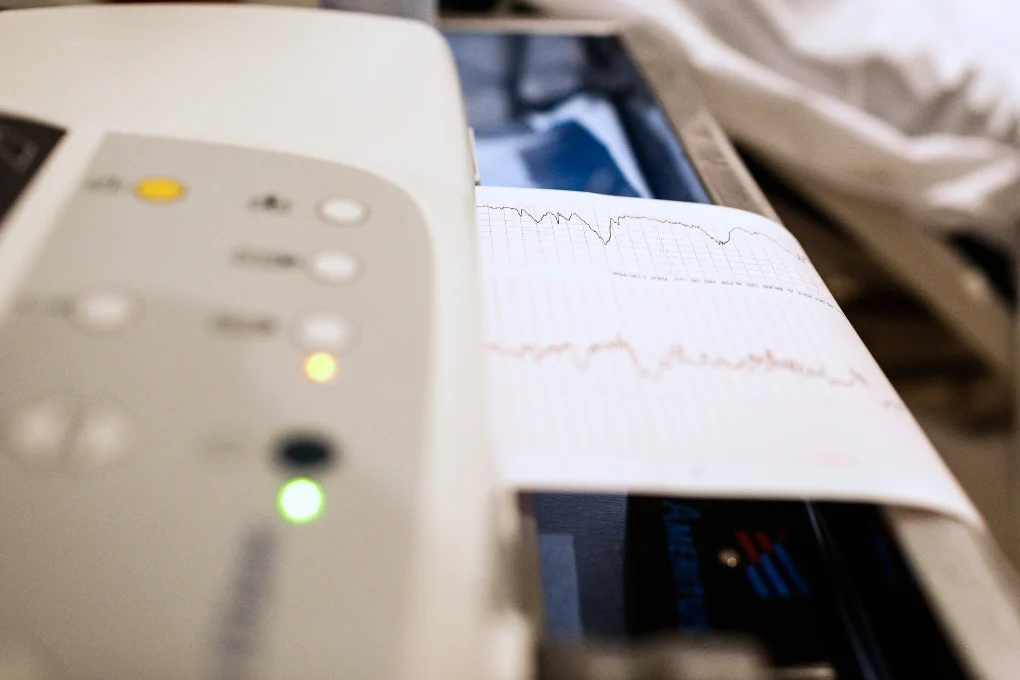If your doctor has referred you for heart testing, you might be wondering what the difference is between an electrocardiogram (ECG) and an echocardiogram. While both are commonly used to assess heart health, they do very different things and understanding the difference can help you feel more confident about your care.
At SmartCare Diagnostics, we provide both ECGs and echocardiograms, along with other essential cardiac services and conditions testing. We offer bulk-billed diagnostics at our convenient Brisbane clinics, including North Lakes, Springfield, Taringa, Capalaba, Gatton, Ipswich and Upper Mt. Gravatt.
Here’s what you need to know about these two important heart tests.

What Is An Electrocardiogram (ECG)?
An ECG is a simple, quick test that records your heart's electrical activity. Electrical impulses control every heartbeat, and an ECG captures these signals to assess your heart's rhythm and rate.
What It Detects:
- Irregular heart rhythms (arrhythmias)
- Signs of previous heart attacks
- Electrical abnormalities
- Fast or slow heart rate
- Effects of medication on your heart
What To Expect During An ECG:
- Small electrodes are placed on your chest, arms, and legs.
- Wires connect the electrodes to a machine that graphs your heart's electrical signals.
- The test is quick, typically 5-10 minutes, and you’ll be asked to lie still.
It’s a commonly performed cardiac service and is often the first step in investigating heart-related symptoms such as palpitations, dizziness, or chest discomfort.
What Is An Echocardiogram?
An echocardiogram is a heart ultrasound. It uses high-frequency sound waves to create moving images of your heart, showing how its muscles and valves function.
What It Detects:
- Size and shape of the heart
- Pumping strength (ejection fraction)
- Valve problems (leaks, narrowing)
- Congenital heart defects
- Blood flow issues or fluid around the heart
What To Expect During An Echocardiogram:
- You’ll lie on your side on an exam table.
- A sonographer will apply gel to your chest and use a small probe (transducer) to scan your heart.
- The scan is non-invasive and typically takes about 20-30 minutes.
- The machine converts the sound waves into real-time moving images.
Unlike an ECG, which gives a snapshot of electrical activity, an echocardiogram provides a visual assessment of your heart’s motion and functions.
ECG vs Echocardiogram: Key Differences At A Glance
| Feature | ECG | Echocardiogram |
| Type of Test | Electrical | Ultrasound |
| What It Shows | Rhythm, rate, electrical issues | Size, pumping function, valves |
| Duration | 5-10 minutes | 20-30 minutes |
| Used For | Irregular heartbeat, palpitations, monitoring medication | Valve disease, heart failure, cardiomyopathy, structural problems |
In many cases, your doctor may request both tests to get a complete picture of your heart’s health.
When Are These Tests Ordered?
Doctors often request ECGs and echocardiograms if you are experiencing:
- Chest pain or tightness
- Unexplained fatigue or shortness of breath
- Irregular heartbeat or palpitations
- Fainting spells or dizziness
- History of high blood pressure or heart disease
- As part of a pre-operative assessment
Bulk Billing And Cost Related Concerns
At SmartCare Diagnostics, we offer bulk billed ECGs and echocardiograms for eligible patients. Here’s what that means:
- No out-of-pocket costs (with a valid Medicare card and referral)
- Covered under the Medicare Benefits Schedule (MBS)
- Performed by qualified, experienced staff in Brisbane clinics
If you have cost-related questions, our friendly team is always happy to walk you through eligibility and explain what’s covered.
Where Can I Get These Tests?
We provide ECG and echocardiogram services at all SmartCare Diagnostics locations:
- North Lakes
- Springfield
- Upper Mt. Gravatt
- Taringa
- Capalaba
- Gatton
- Ipswich
Our clinics are equipped with modern technology, and our staff are trained to ensure a quick, comfortable, and respectful experience.
How Long Does It Take to Get Results?
ECG results are usually available immediately and interpreted by your referring GP or cardiologist. Echocardiogram results may take a few business days to be reviewed by a specialist and sent back to your doctor.
We prioritise fast turnaround so your care plan can begin as soon as possible.
Why Choose SmartCare Diagnostics?
When it comes to your heart, choosing a trusted diagnostics provider matters. Here’s why more Brisbane patients choose SmartCare:
- Same-week appointments
- Bulk billed diagnostics
- Local, community-based clinics
- Professional, compassionate care
- Clear, fast communication with your doctor
We take the mystery out of medical testing, so you can focus on getting the care you need.
How To Book
It’s simple:
- See your GP for a referral.
- Call your nearest SmartCare clinic to make an appointment.
- Bring your referral and Medicare card to your appointment.
We’ll take care of the rest.
Both electrocardiograms (ECGs) and echocardiograms are valuable tools for understanding your heart health, each offering unique insights. If your doctor has recommended one or both, you’re in good hands with SmartCare Diagnostics.
With bulk-billed cardiac testing across Brisbane, at North Lakes, Springfield, Taringa, Capalaba, Gatton, Ipswich and Upper Mt. Gravatt, access to essential heart care has never been easier.
Your heart deserves expert care. We’re here to provide it.
Medical Disclaimer
This article is for general information and educational purposes only. It is not a substitute for professional medical advice, diagnosis, or treatment, and does not establish a doctor-patient relationship. All medical procedures carry risks, and outcomes vary between individuals. Always seek the advice of your GP, specialist, or another appropriately qualified health professional with any questions you may have regarding a medical condition or treatment. Where further or specialised care is required, your treating practitioner can provide an appropriate referral.
Why wait or pay too much for diagnostic tests?